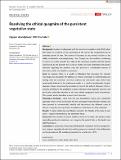Files in this item
Resolving the ethical quagmire of the persistent vegetative state
Item metadata
| dc.contributor.author | Arandjelović, Ognjen | |
| dc.date.accessioned | 2023-05-12T16:30:07Z | |
| dc.date.available | 2023-05-12T16:30:07Z | |
| dc.date.issued | 2023-10-01 | |
| dc.identifier | 285867697 | |
| dc.identifier | 03513d7b-7de8-4368-89dd-58bd32db965c | |
| dc.identifier | 85158107727 | |
| dc.identifier.citation | Arandjelović , O 2023 , ' Resolving the ethical quagmire of the persistent vegetative state ' , Journal of Evaluation in Clinical Practice , vol. 29 , no. 7 , pp. 1108-1118 . https://doi.org/10.1111/jep.13848 | en |
| dc.identifier.issn | 1356-1294 | |
| dc.identifier.other | RIS: urn:E87B9DFC4DE92D85C7B993C04ECC04E7 | |
| dc.identifier.uri | https://hdl.handle.net/10023/27610 | |
| dc.description.abstract | Background A patient is diagnosed with the persistent vegetative state (PVS) when they show no evidence of the awareness of the self or the environment for an extended period of time. The chance of recovery of any mental function or the ability to interact in a meaningful way is low. Though rare, the condition, considering its nature as a state outwith the realm of the conscious, coupled with the trauma experienced by the patient's kin as well as health care staff confronted with painful decisions regarding the patient's care, has attracted a considerable amount of discussion within the bioethics community. Aims At present, there is a wealth of literature that discusses the relevant neurology, that elucidates the plethora of ethical challenges in understanding and dealing with the condition, and that analyses the real-world cases which have prominently featured in the mainstream media as a result of emotionally charged, divergent views concerning the provision of care to the patient. However, there is scarcely anything in the published scholarly literature that proposes concrete and practically actionable solutions to the now widely recognized moral conundrums. The present article describes a step in that direction. Materials & Methods I start from the very foundations, laying out a sentientist approach which serves as the basis for the consequent moral decision-making, and then proceed to systematically identify and deconstruct the different cases of discord, using the aforementioned foundations as the basis for their resolution. Results A major intellectual contribution concerns the fluidity of the duty of care which I argue is demanded by the sentientist focus. Discussion The said duty is shown initially to have for its object the patient, which depending on the circumstances, can change to the patient's kin, or the health care staff themselves. Conclusion In conclusion, the proposed framework represents the first comprehensive proposal regarding the decision-making processes involved in the deliberation on the provision of life sustaining treatment to a patient in a PVS. | |
| dc.format.extent | 11 | |
| dc.format.extent | 1611930 | |
| dc.language.iso | eng | |
| dc.relation.ispartof | Journal of Evaluation in Clinical Practice | en |
| dc.subject | Coma | en |
| dc.subject | Consciousness | en |
| dc.subject | Death | en |
| dc.subject | Dignity | en |
| dc.subject | Duty | en |
| dc.subject | Family | en |
| dc.subject | T-DAS | en |
| dc.subject | MCC | en |
| dc.title | Resolving the ethical quagmire of the persistent vegetative state | en |
| dc.type | Journal article | en |
| dc.contributor.institution | University of St Andrews. School of Computer Science | en |
| dc.identifier.doi | 10.1111/jep.13848 | |
| dc.description.status | Peer reviewed | en |
This item appears in the following Collection(s)
Items in the St Andrews Research Repository are protected by copyright, with all rights reserved, unless otherwise indicated.

